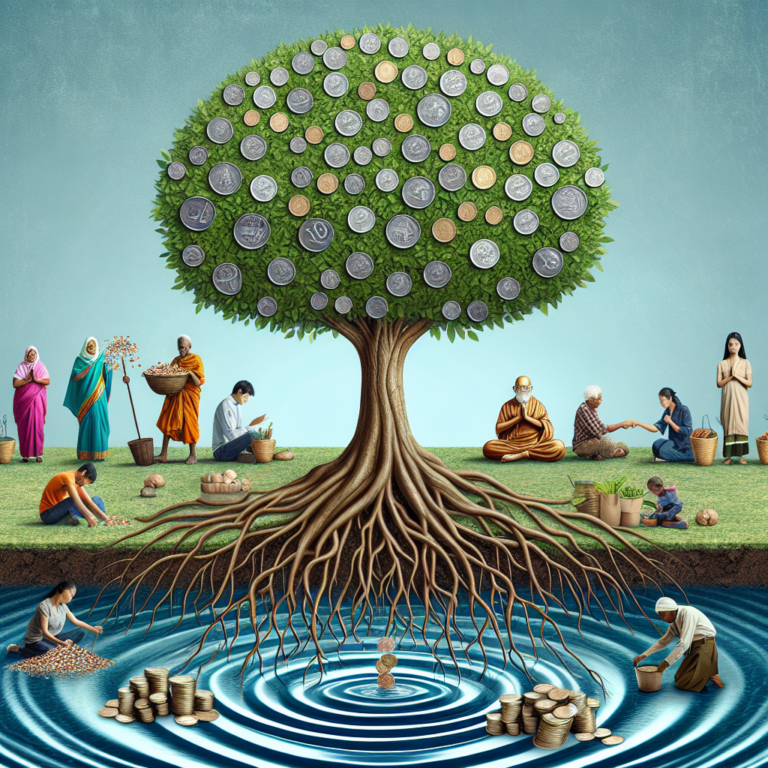Karma, often misinterpreted as merely a concept of good fortune or bad luck, is a deeply rooted philosophical term that encompasses much more than simplistic notions of reward and punishment. Steeped in Eastern philosophies, particularly within Hinduism and Buddhism, karma embodies the belief that every action has consequences that shape our experiences and future. However, this rich concept is frequently misunderstood, leading to the proliferation of myths that distort its true essence. This article seeks to debunk common misconceptions surrounding karma and to provide clarity on its principles of cause and effect.
Understanding Karma
Karma derives from the Sanskrit word "karman," which means "action." In its most fundamental sense, karma refers to the principle of cause and effect wherein every action, thought, or intention creates a corresponding result, impacting the doer’s future. This cycle of actions and consequences extends beyond individual lives through the law of reincarnation, suggesting that one’s actions in this life can influence future existences.
However, karma is not a simplistic transactional model of reward and punishment. Rather, it encompasses the totality of actions, intentions, and thoughts wielded by an individual. It emphasizes personal responsibility and the interconnectedness of all beings, highlighting that every action has implications not only for the self but also for others.
Common Myths About Karma
Myth 1: Karma is Punitive
One prevalent myth is that karma serves as a form of divine retribution, punishing individuals for their bad deeds while rewarding good behavior. This view frames karma as a verdict rendered by a higher power. In reality, karma functions as an immutable law of cause and effect. The notion of punishment is a human interpretation of the natural consequences of actions. Rather than a cosmic judge, karma acts as a mirror reflecting our actions, creating a context for learning and growth rather than fear and retribution.
Myth 2: Karma Works Instantly
Another misconception is that karma operates immediately, meaning that good or bad actions will result in instant outcomes. People often say, “What goes around comes around,” implying that a positive or negative act will return to the doer almost instantaneously. However, karma operates beyond the confines of time; the effects of actions can manifest later in life or even in future incarnations. Immediate consequences can be seen but are not always the norm; sometimes, the lessons learned take longer to come to fruition, and a more complex interplay of past actions dictates one’s current circumstances.
Myth 3: All Actions Result in Equal Karma
Many believe that every action results in the same kind of karma, irrespective of context or intention. For instance, an action driven by genuine compassion is often perceived as having the same weight as a self-serving deed. In reality, karma involves subtleties, with intentions and context playing crucial roles. A positive action stemming from a selfish motive may yield differing results than one arising from genuine altruism. The ethical quality behind our actions influences the karmic outcome—and understanding this can help us navigate our decisions more wisely.
Myth 4: Karma is About Accumulating Good Deeds
Some individuals misconstrue karma as a system that operates like a bank account, wherein good deeds are deposited, and bad deeds are liabilities. In this view, one can “pay off” karmic debts simply by performing enough good actions. This transactional perspective misses the broader implications of interconnectedness and intention. While positive actions undoubtedly cultivate favorable circumstances, the practice of goodness is not about counting deeds but about fostering a mindset and lifestyle conducive to empathy, understanding, and active compassion.
Myth 5: Karma Only Applies to Individuals
Another common misconception is that karma solely pertains to individuals. Many people think that only personal actions and their consequences create one’s karmic footprint. However, karma also encompasses collective actions and societal influences. Communities and cultures create karma, suggesting that societal injustices and collective actions can generate karmic repercussions. The collective dimensions of karma emphasize the importance of social responsibility and moral stewardship in fostering positive change in society.
Myth 6: Karma is Fatalistic
Karma is sometimes misinterpreted as a deterministic force dictating one’s life path, where individuals are helplessly subject to their past actions. This view fosters a sense of fatalism, where personal agency and choice seem diminished. Contrary to this belief, karma encourages awareness and personal responsibility. While past actions may shape our circumstances, individuals have the power to change their karma through conscious choices, intentions, and actions. Every moment presents an opportunity for growth and transformation.
Myth 7: One Can Escape Karma
Some may believe that through rituals, prayers, or specific actions, they can evade karmic consequences. This notion leans on a misunderstanding of karma’s intrinsic nature. Escaping karma is akin to trying to escape the laws of nature; while we may temporarily evade certain consequences, the underlying realities of our actions persist. The path to address or nullify the effects of karma lies not in avoidance but in genuine engagement with accountability and transformation.
Conclusion
The concept of karma is far richer and more complex than the common myths associated with it. Understanding the nuanced nature of karma requires an exploration of personal responsibility, intention, and the interconnectedness of actions. It is important to recognize that karma is not merely about retribution, but a broader framework for moral understanding and growth. By debunking these myths, we can foster a more enlightened approach to our actions, encouraging mindfulness in our interactions and promoting a more compassionate perspective on life.
FAQs About Karma
Q1: Can karma change over time?
A1: Yes, karma is dynamic. As individuals change their actions, intentions, and behaviors, they can influence their karmic path. Every new decision can create new karma.
Q2: If I do something good, will I be rewarded soon?
A2: Not necessarily. While good actions may eventually result in positive outcomes, the timeframe is unpredictable. The effects of karma can unfold over various lifetimes.
Q3: Is karma the same as fate?
A3: No, karma is not the same as fate. While karma reflects the consequences of actions, fate suggests a predetermined path. Karma emphasizes personal choice and accountability.
Q4: Can my actions affect others’ karma?
A4: Yes, actions can influence the karma of others. Since karma highlights interconnectedness, our actions can create ripple effects that impact the experiences and actions of others.
Q5: How can I improve my karma?
A5: Improving karma involves cultivating positive intentions, engaging in compassionate actions, and being accountable. Practicing mindfulness in our daily interactions and fostering kindness can promote positive outcomes.
In understanding the depth of karma, we embrace the complexity of life, relationships, and the human experience—building a framework for empathy, accountability, and personal growth.
Sure! What kind of prompt are you looking for? Are you interested in a writing prompt, a creative idea, a question for discussion, or something else? Let me know how I can assist you!, #Karma #Unveiled #Debunking #Common #Myths #Effect, #Karma #Unveiled #Debunking #Common #Myths #Effect, 1734917102, karma-unveiled-debunking-common-myths-about-cause-and-effect





